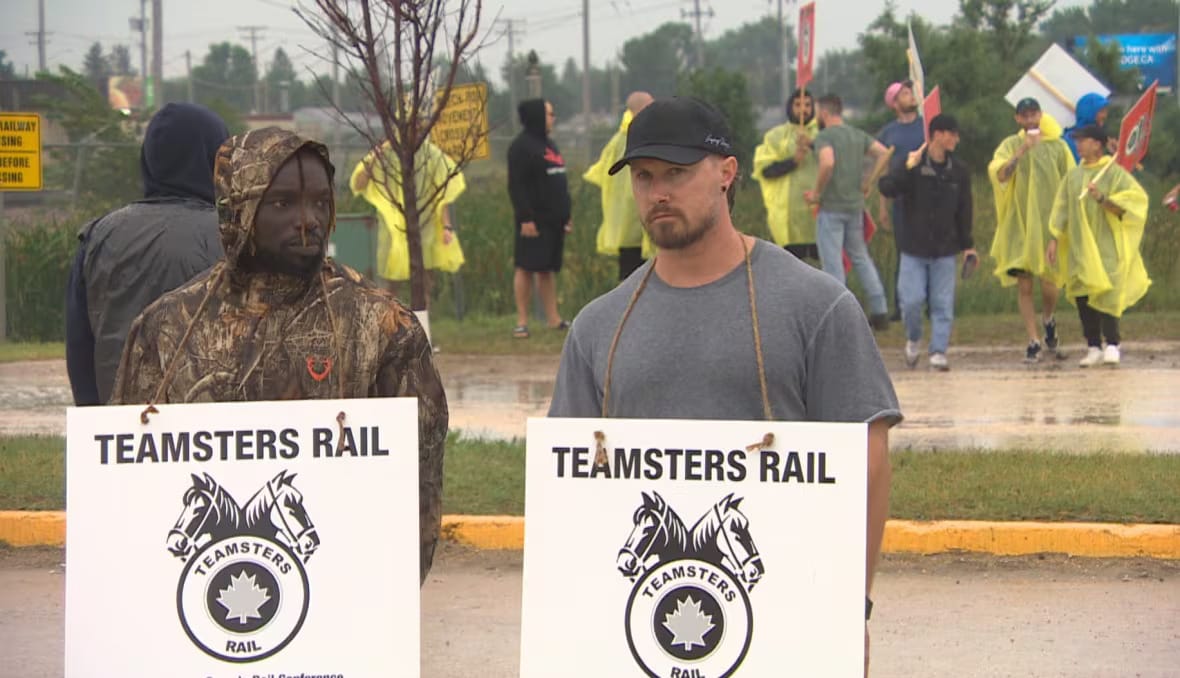Rail lockout 'irresponsible,' Manitoba premier says, as expert suggests Ottawa needs to step in
'This is really bad for our provincial economy,' Premier Wab Kinew says

The federal government needs to act swiftly to reduce the economic impact of the railway disruption affecting Manitoba and the rest of Canada, according to a supply chain management expert.
"There's an old saying that hope is not a strategy, but that seemed to be the government's approach yesterday — hoping for a resolution. And it didn't happen," said Barry Prentice, a professor of supply chain management at the University of Manitoba.
"It seems the adults need to step in and resolve this if the two sides can't reach an agreement. And they need to do it quickly."
For the first time in Canadian history, freight traffic on both of the country's largest railways has come to a standstill.
After months of tense negotiations, Canadian National and Canadian Pacific Kansas City have locked out 9,300 engineers, conductors, and yard workers after failing to reach a new contract before the midnight deadline.
The Railway Association of Canada states that these two companies move approximately $1 billion worth of goods daily.
In Manitoba, the southern region will feel the most significant impact, Prentice told CBC Manitoba Information Radio host Marcy Markusa on Thursday.
"About one-quarter of all their freight is grain and fertilizer, so those sectors will be hit hard," he said.
Intermodal containers, which make up roughly another quarter of the goods transported, will also be affected. Rail intermodal involves shipping containers moved on rail flatbeds, then transferred to semi-trailer trucks for road transport. These containers carry a variety of goods, including retail products and industrial items.
"So, the impact on those two sectors — container shipping and agriculture supplies — will be immediate," Prentice noted.
However, northern Manitoba rail lines are less affected by the disruption in the south, Prentice said.
"The Hudson Bay Railway isn't on strike, and while they rely on shipments to Churchill, it's a small part of the overall picture," he explained.
The average consumer is unlikely to feel the effects right away, though supply chain issues could arise shortly, Prentice added.
"Railways primarily move raw materials and bulk products, so there shouldn't be an immediate impact on food prices," he said.
"Of course, if railway rates go up, it could affect certain transported goods, but it will take time for that to trickle through the market."
The longer the railways remain inactive, the harder it will be to get them back on track, Prentice warned.
"You can't just restart the railway instantly. For every day of shutdown, they say it takes at least a week to catch up," he said.
"So depending on how long this lasts, it could take a couple of months to clear the backlog in the rail system."
Manitoba Premier Wab Kinew emphasized that agriculture is the backbone of the provincial economy and said his government is communicating with federal officials to voice concerns about the stoppage.
"This is really damaging to our provincial economy, and it's irresponsible for these companies to be locking out their employees," he told Markusa on Thursday.
"For those in the middle of harvest season, or moving deeper into it, there's a significant concern about getting agricultural products to market. It will also impact input costs and increase overall uncertainty."
"We need the federal government to resolve this situation."
How exactly that should be done remains uncertain.
"There's been talk of binding arbitration, but I'm not sure it's the best fit in this case, given the detailed health and safety considerations involved. Bringing in an arbitrator at the last minute might not be the optimal solution," Kinew said.
Prentice believes the government will have to intervene — "convene Parliament, pass legislation, and force the system back into operation" — within seven to 10 days if the deadlock continues.
"The impact on the economy is too significant to ignore and simply hope that the workers and railways will find a solution," he said.





